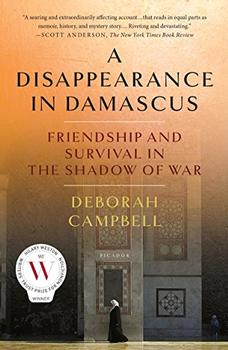Summary | Excerpt | Reviews | Beyond the Book | Readalikes | Genres & Themes | Author Bio

Critics' Opinion:
Readers' Opinion:
First Published:
Sep 2017, 352 pages
Paperback:
Sep 2018, 352 pages
 Book Reviewed by:
Book Reviewed by:
Rose Rankin
Buy This Book
Chapter 1
EXODUS
ALONG THE TWO-LANE HIGHWAY from Syria's capital city of Damascus, where it approaches the border with Iraq, anti-aircraft batteries scanned the dome of noonday sky. Here and there an army tank rumbled over hot sand along a barren landscape that looked like the surface of Mars. Next to the highway, a crop of bored young Syrian soldiers slouched on boulders around a commander making diagrams on a chalkboard propped up against another boulder.
Gripped by the anticipation I always feel when I am about to plunge into an unknown situation, I was greeted by a weathered road sign that broke the tension. It read, in English, Happy Journey. A lovely sentiment—I had to take a picture. It was the peak of Iraq's civil war, and absolutely no one was travelling into Iraq on a happy journey; a million and a half refugees had already fled the other way, to Syria, and they were happy for nothing but to be alive. In the sliver of shade the sign provided from the scorching sun, people stood with their suitcases, gazing back towards the country they had left behind.
Beyond them, past a giant parking lot, more Iraqis were streaming towards me into Syria, disgorged from buses and SUVs. In the early days of the exodus there had been time to make arrangements, to sell houses and cars and belongings. Now the entire middle class was on the run: the doctors and professors and librarians, the filmmakers and painters and novelists, the engineers and accountants and technocrats—the people who thought things, made things, kept things humming. Half the professional class had already left, and two thousand more funnelled through this unimpressive desert crossing every day. Some looked dressed for the office, women in high heels and oversized sunglasses, men in pleated dress pants and button-down shirts, as if they'd walked out of work, grabbed the kids and the cash, and just left.
Watching them, the very people I'd come to the border to talk to, I almost didn't see the border guard as he emerged from a makeshift checkpoint and stepped in front of the car I'd hired. The checkpoint, despite the barred windows, was more shepherd's hut than blazing emblem of officialdom. But officialdom it was. He waved my driver to park in the dirt to the side. As I was getting out—jamming my notebook into the bag that carried my camera and audio recorder, rooting around for my passport, ignoring the furnace blast of heat—a large white press van pulled up beside me. The door slid open and an American TV news crew stepped out.
It was rare to meet other journalists in Syria so I was surprised. I had been doing my best to stay under the radar, to avoid undue attention, and here I was arriving with the cavalry. Waiting in the shade cast by the checkpoint while our documents were taken away to be examined, I asked the cameraman, a frenetic thirtyish guy with a shaved head, where he was based.
"Dixie," he said.
Dixie?
He laughed. "That's our code for the 'Zionist entity,' as they say around here." Jerusalem, like Beirut, was a hub for the international press. "I spend most of my time on the beach in Tel Aviv." For this short-term assignment the news team was staying at the Four Seasons in Damascus. They had taken the same highway from the city to the border crossing this morning that I had.
I glanced in the direction of the immigration building where we would soon be competing to interview the new arrivals. I hate reporting in packs. "Do you ever go into Iraq?" I asked, indicating the refugees.
"Only when I have to," he said. "To justify my paycheque." When reporting from Iraq, the network made sure its staff was heavily guarded. This was good for the staff but bad for journalism. "My bosses want me to leave our base, but I refuse. I'm not gonna get killed so they can get a story."
Excerpted from A Disappearance in Damascus by Deborah Campbell. Copyright © 2017 by Deborah Campbell. Excerpted by permission of Picador. All rights reserved. No part of this excerpt may be reproduced or reprinted without permission in writing from the publisher.





The Flower Sisters
by Michelle Collins Anderson
From the new Fannie Flagg of the Ozarks, a richly-woven story of family, forgiveness, and reinvention.

The House on Biscayne Bay
by Chanel Cleeton
As death stalks a gothic mansion in Miami, the lives of two women intertwine as the past and present collide.

The Funeral Cryer by Wenyan Lu
Debut novelist Wenyan Lu brings us this witty yet profound story about one woman's midlife reawakening in contemporary rural China.
Your guide toexceptional books
BookBrowse seeks out and recommends the best in contemporary fiction and nonfiction—books that not only engage and entertain but also deepen our understanding of ourselves and the world around us.